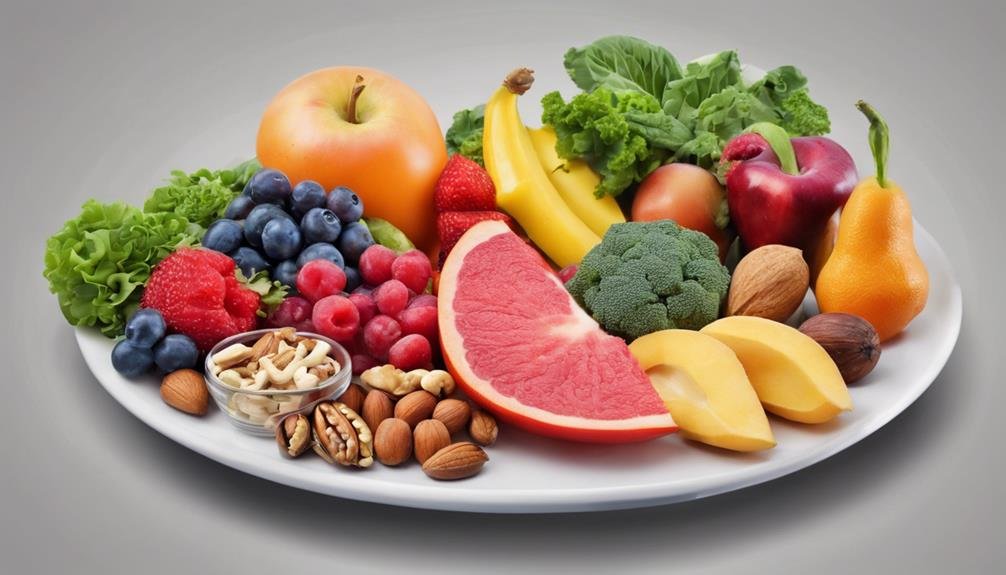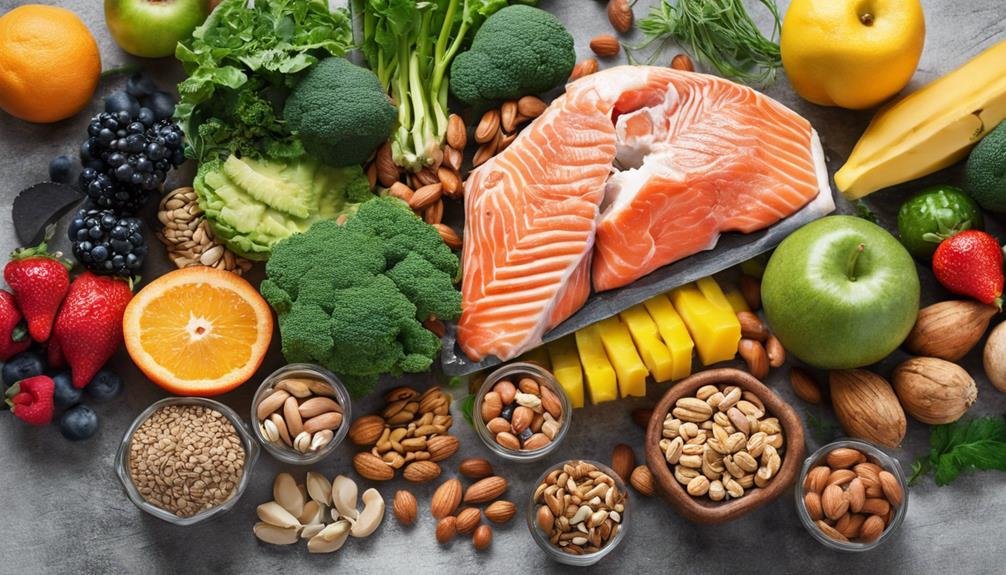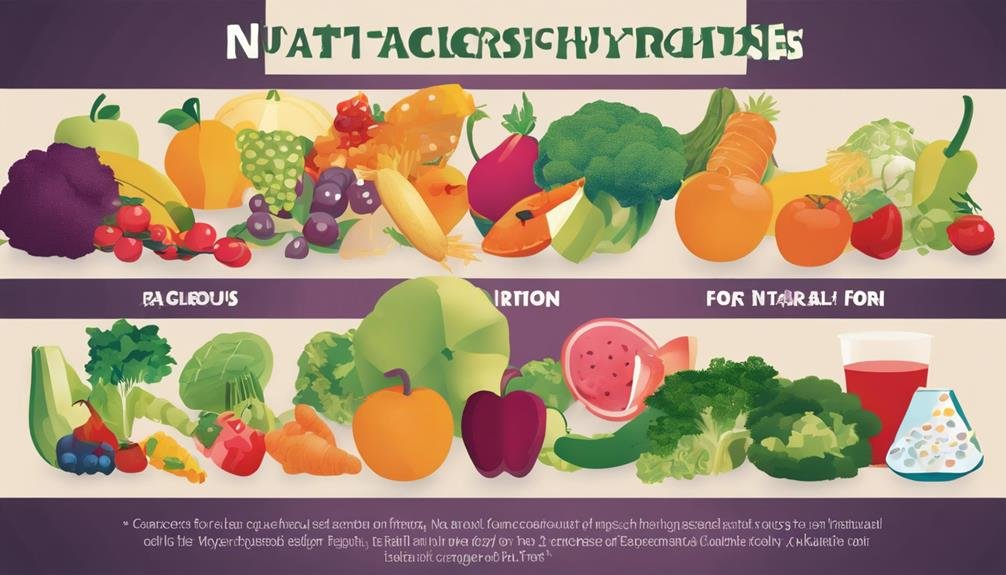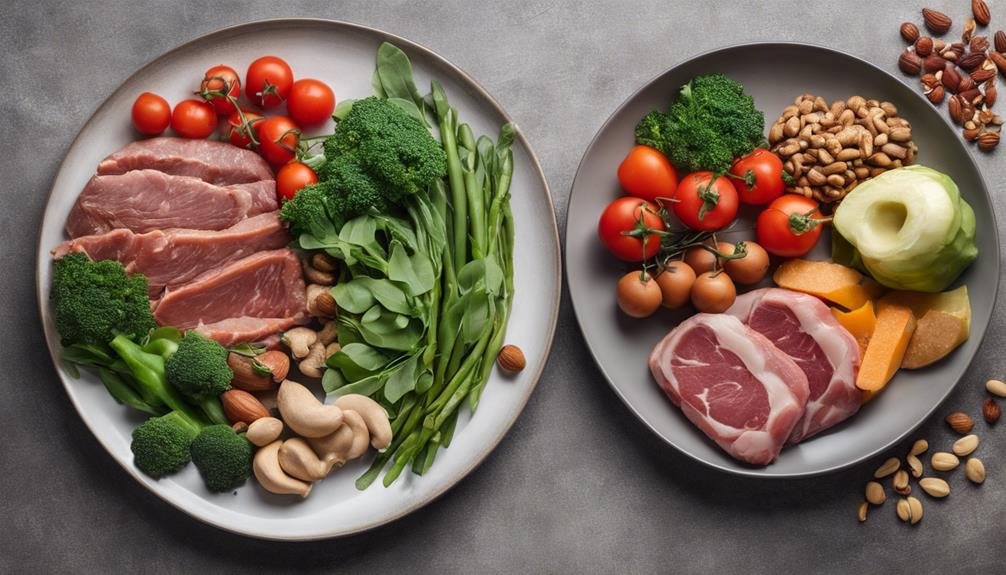You may not be aware that the Paleo diet, with its focus on whole, unprocessed foods, is gaining attention for its potential benefits during cancer treatment. But, before you make any dietary changes, it's crucial to understand how this approach aligns with your specific treatment plan. While some experts advocate for its immune-boosting and anti-inflammatory properties, others raise concerns about potential nutrient deficiencies. Join us as we explore expert insights on the safety and efficacy of adopting a Paleo diet while undergoing cancer treatment.
Overview of Paleo Diet
If you're considering the Paleo diet while undergoing cancer treatment, understanding its principles is crucial.
The Paleo diet focuses on whole, unprocessed foods that our ancestors would have eaten, such as lean meats, fish, fruits, vegetables, nuts, and seeds. By eliminating processed foods, sugars, and grains, the Paleo diet aims to reduce inflammation in the body and provide essential nutrients for overall health.
During cancer treatment, maintaining a nutritious diet is essential to support your body's healing process. The Paleo diet can be a good option as it emphasizes nutrient-dense foods that can help boost your immune system and provide energy during treatment.
However, it's important to consult with your healthcare team before making any significant dietary changes to ensure it aligns with your treatment plan and individual needs.
Importance of Nutrient Density
Understanding the importance of nutrient density in your diet, particularly during cancer treatment, is key to optimizing your body's ability to heal and recover. Nutrient-dense foods provide essential vitamins, minerals, and antioxidants that support your immune system and overall health. During cancer treatment, your body may have increased nutritional needs due to the treatment's effects and the disease itself.
Choosing nutrient-dense foods such as leafy greens, colorful vegetables, lean proteins, and healthy fats can help nourish your body and support your energy levels.
Focusing on nutrient density can also help combat common side effects of cancer treatment like fatigue, nausea, and weight changes. By providing your body with the necessary nutrients, you can potentially boost your resilience and aid in the recovery process.
Incorporating a variety of nutrient-rich foods into your Paleo diet can ensure that you're meeting your body's nutritional requirements during this critical time. Remember, prioritizing the quality of nutrients in your meals can play a significant role in supporting your overall well-being as you navigate through cancer treatment.
Impact on Treatment Efficacy

Enhancing the nutrient density of your diet through incorporating Paleo principles can potentially impact the efficacy of your cancer treatment. By focusing on whole foods rich in vitamins, minerals, and antioxidants, you provide your body with the necessary tools to support its natural healing processes and optimize the effects of medical interventions.
Research suggests that a diet abundant in nutrient-dense foods can help manage side effects of cancer treatments like chemotherapy and radiation, potentially improving their effectiveness and your overall well-being during this challenging time.
Moreover, certain components of the Paleo diet, such as increased consumption of fruits, vegetables, and healthy fats, have been linked to anti-inflammatory and immune-boosting effects. These properties may contribute to creating an internal environment that's less conducive to cancer growth and more supportive of treatment outcomes.
While diet alone isn't a cure for cancer, making mindful dietary choices aligned with Paleo principles can complement your treatment plan and enhance its potential benefits.
Potential Benefits for Patients
Transitioning to a Paleo-inspired diet during cancer treatment may offer notable benefits for patients navigating this challenging journey. Research suggests that a diet rich in whole foods, lean proteins, fruits, and vegetables can provide essential nutrients to support your body's immune system and overall health during treatment.
By focusing on real, unprocessed foods, you can reduce inflammation and oxidative stress, which are crucial factors in cancer progression. Additionally, the Paleo diet emphasizes the importance of eliminating processed sugars and unhealthy fats, which may help in managing side effects like fatigue, nausea, and weight loss commonly experienced during cancer treatment.
The emphasis on nutrient-dense foods can also support your body in maintaining muscle mass and strength, aiding in your recovery process. Remember, every person's journey is unique, so consulting with your healthcare team before making any dietary changes is essential to ensure that the Paleo-inspired diet aligns with your individual needs and treatment plan.
Concerns About Restrictiveness

For some individuals considering a Paleo-inspired diet during cancer treatment, a valid concern revolves around the perceived restrictiveness of this eating approach. It's understandable to worry that following a Paleo diet might limit your food choices, making it challenging to meet your nutritional needs during such a crucial time. However, it's essential to approach this concern with a balanced perspective.
While the Paleo diet does exclude certain food groups like dairy, grains, and legumes, it still offers a wide variety of nutrient-dense options. Focusing on incorporating plenty of vegetables, fruits, lean proteins, healthy fats, and nuts can provide you with a well-rounded and nourishing eating plan.
Additionally, there's flexibility within the Paleo framework to adapt the diet to your individual preferences and needs.
Addressing Nutritional Needs
Considering your nutritional needs during cancer treatment is paramount, especially when contemplating a dietary shift like the Paleo approach. It's crucial to ensure that your body receives the necessary nutrients to support your overall health and well-being while undergoing cancer treatment.
The Paleo diet, rich in lean proteins, fruits, vegetables, nuts, and seeds, can provide essential vitamins, minerals, and antioxidants that support your immune system and help maintain your strength during this challenging time.
When following a Paleo diet during cancer treatment, focus on consuming a variety of nutrient-dense foods to meet your daily requirements. Incorporating a rainbow of fruits and vegetables can provide a wide range of antioxidants that may aid in reducing inflammation and supporting your body's natural defenses.
Additionally, lean proteins like poultry, fish, and eggs can help maintain muscle mass and promote tissue repair, which is crucial during cancer treatment.
Expert Recommendations on Paleo

Navigating the Paleo diet during cancer treatment can be a challenging yet potentially beneficial endeavor. When it comes to expert recommendations on following a Paleo diet while undergoing cancer treatment, it's essential to seek guidance from healthcare professionals experienced in both oncology and nutrition. These experts can provide personalized advice tailored to your specific needs and treatment plan.
While the Paleo diet emphasizes whole foods, lean proteins, fruits, and vegetables, it's crucial to ensure you're meeting your body's nutritional requirements during this critical time.
Experts often recommend working with a registered dietitian who can help you modify the Paleo diet to ensure you're getting enough calories, protein, and other essential nutrients to support your treatment and recovery. They may suggest incorporating healthy fats, like avocados and nuts, to provide additional energy, as well as adjusting your intake of certain foods based on your treatment side effects.
Personalized Approaches in Cancer Care
When navigating cancer care, personalized approaches tailored to your unique circumstances can make a significant difference in your treatment journey. Your healthcare team will consider various factors such as the type and stage of cancer, your overall health, and any other specific needs you may have.
Personalized cancer care involves creating a treatment plan that addresses not only the cancer itself but also your emotional well-being and quality of life during and after treatment.
Through personalized approaches, your medical team can tailor treatments to match your individual characteristics, potentially enhancing the effectiveness of the therapy while minimizing side effects. This tailored approach may include targeted therapies, precision medicine based on genetic testing, or complementary therapies to help manage treatment-related symptoms.
Remember that you're a unique individual, and your cancer care should reflect that. By working closely with your healthcare providers to develop a personalized care plan, you can feel more supported and empowered throughout your cancer journey.
Trust in the process, stay informed, and advocate for your needs to ensure the best possible outcome for your treatment and overall well-being.
Supporting Overall Well-being

Supporting your overall well-being throughout cancer treatment is crucial for not only managing the physical aspects of the disease but also nurturing your emotional and mental health. Eating a well-balanced diet, staying physically active within your limits, and engaging in activities that bring you joy can all contribute to your overall well-being. Remember to listen to your body and communicate openly with your healthcare team about how you're feeling.
In addition to physical health, taking care of your emotional and mental well-being is equally important. Surround yourself with a supportive network of friends and family, consider joining a support group or speaking with a counselor to process your emotions. Engaging in mindfulness practices such as meditation or yoga can also help reduce stress and promote a sense of calm.
Managing Side Effects
To effectively manage the side effects experienced during cancer treatment, it's crucial to communicate openly with your healthcare team and actively participate in discussions about your symptoms and concerns.
Your healthcare team is there to support you through this challenging time, so don't hesitate to share any discomfort or issues you may be facing.
Whether it's nausea, fatigue, pain, or any other side effect, your medical team can provide valuable guidance and interventions to help alleviate these symptoms.
Balancing Macronutrients
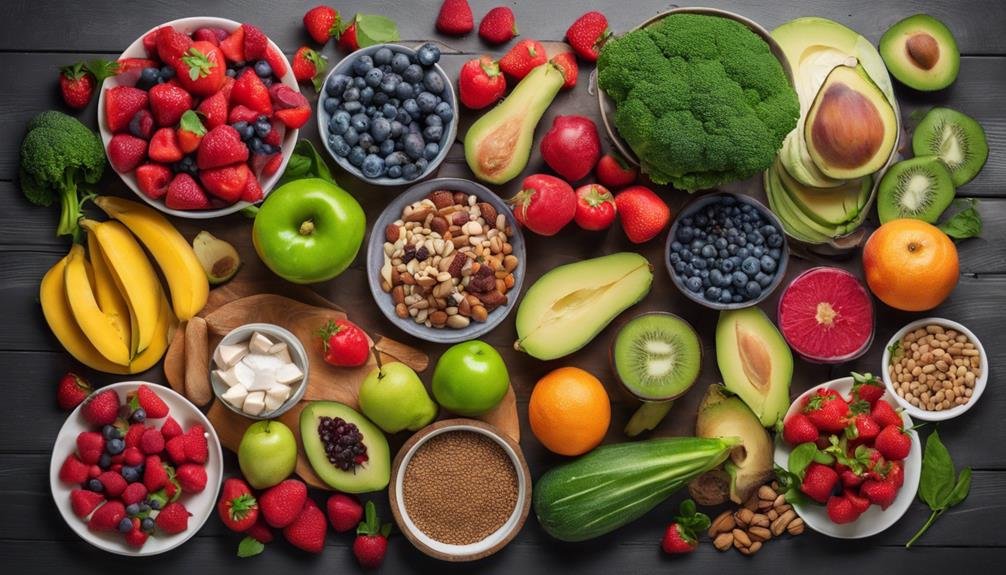
As you navigate through cancer treatment, maintaining a well-balanced diet that includes the right mix of macronutrients is key to supporting your overall health and well-being. Balancing macronutrients such as carbohydrates, proteins, and fats can play a crucial role in helping you manage energy levels, support your immune system, and aid in the recovery process.
Carbohydrates are essential as they provide your body with energy. Opt for complex carbohydrates like whole grains, fruits, and vegetables to fuel your body effectively.
Proteins are important for repairing tissues and supporting your immune system. Include lean sources of protein such as poultry, fish, legumes, and nuts in your meals.
Healthy fats, such as those found in avocados, olive oil, and nuts, are vital for absorbing certain nutrients and maintaining cell structure.
Future Research Directions
Exploring potential future research directions holds promise for enhancing our understanding of how dietary interventions, such as the Paleo diet, may interact with cancer treatment. Moving forward, investigating the specific mechanisms through which the Paleo diet impacts cancer progression and treatment outcomes could provide valuable insights. Research focusing on the effects of the Paleo diet on inflammation, oxidative stress, insulin sensitivity, and gut microbiota in the context of cancer treatment is crucial.
Furthermore, exploring the potential synergies between the Paleo diet and conventional cancer therapies like chemotherapy and radiation therapy is essential. Understanding how these treatments interact with the dietary components of the Paleo diet may lead to optimized treatment protocols and improved patient outcomes.
Future studies should also consider the long-term effects of the Paleo diet on cancer survivors, including recurrence rates, quality of life, and overall survival. By addressing these research questions, we can better tailor dietary recommendations for cancer patients undergoing treatment and survivors aiming to prevent disease recurrence.
Frequently Asked Questions
Can a Paleo Diet Interfere With Chemotherapy or Radiation Therapy?
A paleo diet may interact with chemotherapy or radiation therapy. It's crucial to consult your healthcare team before making any dietary changes during cancer treatment. Some components of the paleo diet, like high protein intake, may affect how your body responds to therapy. Your medical team can provide personalized guidance to ensure your diet supports your treatment plan and overall well-being. Always prioritize open communication with your healthcare providers for the best outcomes.
Are There Any Specific Paleo-Approved Foods That Cancer Patients Should Avoid?
When considering a paleo diet during cancer treatment, it's advisable to avoid processed meats due to potential harmful compounds formed during cooking. Opt for lean proteins like poultry, fish, and plant-based sources instead.
Also, limit intake of high-sugar fruits and refined sugars to help maintain stable blood sugar levels. Focus on whole, nutrient-dense foods to support your body's nutritional needs during this challenging time.
How Can Someone on a Paleo Diet Manage Nausea From Cancer Treatment?
When managing nausea from cancer treatment on a paleo diet, opt for easily digestible foods like bone broth, ginger, and small frequent meals.
Stay hydrated with herbal teas or coconut water. Avoid strong smells and spicy foods that may trigger nausea.
Experiment with bland, soothing foods like bananas, applesauce, or sweet potatoes.
Listen to your body, rest, and consult with your healthcare team for personalized advice on managing nausea during cancer treatment.
Is It Safe to Follow a Strict Paleo Diet if Undergoing Surgery?
During surgery, sticking to a strict paleo diet can be safe if you plan it carefully. Make sure to include nutrient-dense foods to support your body's healing process. Prioritize lean proteins, healthy fats, and plenty of vegetables to aid recovery. Stay hydrated and listen to your body's needs.
Can a Paleo Diet Affect Blood Counts During Cancer Treatment?
Following a paleo diet during cancer treatment may impact blood counts due to potential nutrient deficiencies. Ensure you're getting enough iron, folate, and vitamin B12 which are crucial for healthy blood cell production. Consult with your healthcare team to monitor your blood counts regularly and make any necessary adjustments to your diet or supplement regimen.
Prioritize a well-rounded approach to nutrition to support your body's needs during this challenging time.
Conclusion
As you journey through cancer treatment, think of the Paleo diet as a sturdy ship guiding you through rough waters. Its nutrient-rich foods serve as anchors, grounding you in strength and resilience. Embrace the simplicity and power of whole foods to nourish your body, support your immune system, and enhance your overall well-being. Trust in the potential benefits of the Paleo diet to complement your treatment journey and lead you towards a brighter horizon.

